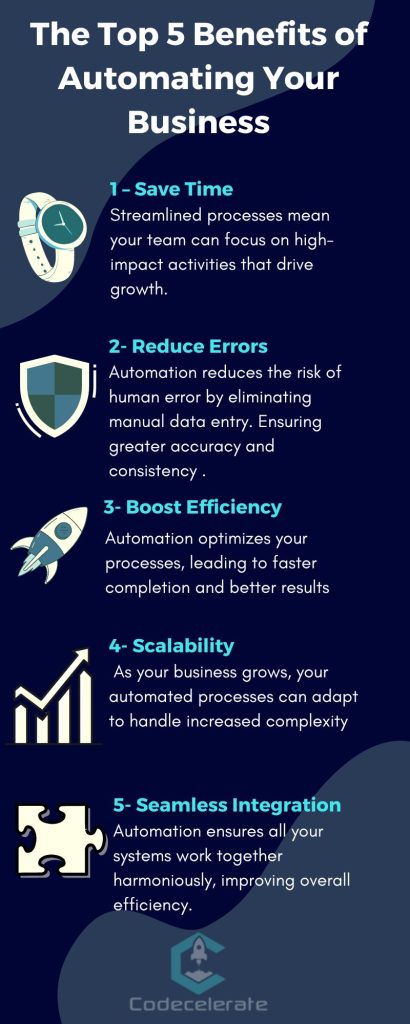In today’s fast-paced business world, efficiency isn’t just a luxury—it’s a necessity. As businesses grow, managing tasks, keeping track of data, and staying on top of communications can become overwhelming. That’s where automation comes in. Whether you’re a small business owner or managing a large team, automating repetitive tasks can save you hours every week, reduce human errors, and help you focus on what truly matters—growing your business.
But what exactly is automation? Simply put, it’s the process of using technology to perform tasks without human intervention. From sending emails to processing payments or even updating records in a database, automation helps you achieve more with less effort.

Common Business Problems That Automation Solves
Many businesses face challenges that are not only time-consuming but can also be costly if handled inefficiently. Let’s look at a few common problems:
- Repetitive Tasks: Think about the countless hours spent each week manually entering data, sending follow-up emails, or updating records. These tasks don’t add value—they take time away from more important work.
- Human Error: No matter how careful your team is, manual data entry and repeated tasks are prone to mistakes. A single error in a customer order, payment processing, or data transfer could result in lost revenue, client dissatisfaction, or more.
- Inconsistent Workflows: Without streamlined processes, your business is likely experiencing delays. Things fall through the cracks when your operations aren’t integrated across platforms, causing frustration for employees and clients alike.
How Automation Transforms Your Business
- Saves Time by Automating Repetitive Tasks Automating routine tasks such as data entry, email notifications, and scheduling saves a significant amount of time. Instead of manually processing invoices or updating records, automation tools like Zapier or Make.com can handle it in the background while you focus on higher-value work.
- Reduces Errors and Ensures Accuracy Automation helps eliminate human error by standardizing tasks. For instance, using automation to transfer data between Google Sheets and your CRM system ensures that data is always accurate and up to date. With fewer errors, you can build stronger relationships with customers, knowing that your processes are reliable.
- Improves Efficiency by Freeing Up Your Team By automating low-level tasks, your team can focus on more strategic activities. Whether it’s refining a marketing campaign or working directly with customers, automation empowers your staff to use their time more effectively. This leads to a more engaged and productive team.
- Scales as Your Business Grows As your business expands, the manual processes that worked when you were smaller will start to break down. Automation scales with you. Once set up, automation workflows can handle higher volumes without requiring additional resources. This means you can grow your operations without worrying about an increase in manual workload.
- Integrates Your Tools and Platforms Seamlessly Today’s businesses use a variety of tools—Slack for communication, Stripe for payments, Airtable for data management, and Google Workspace for collaboration. The real power of automation comes when you integrate all these tools. Platforms like Zapier or Make.com allow you to connect these applications, ensuring data flows smoothly between them without manual intervention.
Tools That Make Automation Possible
Automation doesn’t rely on just one tool but is instead built on a combination of platforms that address various business needs. Here are some of the tools and technologies that can drive business automation:
- Zapier & Make (formerly Integromat): Both of these platforms enable you to create custom automations without code, connecting your apps to automate repetitive tasks, like syncing data between different platforms or triggering events in other applications.
- Airtable & Google Sheets: These are excellent tools for managing and organizing data. With their integration capabilities, they can act as databases that feed information into various automated workflows.
- Monday.com & Asana: Project management platforms like these are essential in automating task assignments, setting due dates, and managing workloads in a team environment. Automated workflows can trigger based on task completion or other milestones.
- Custom Scripting (PowerShell, Python): Not all automation can be achieved through low-code platforms. Sometimes, custom scripting is needed to address complex requirements. I’ve extensively used scripting languages like PowerShell and Python to automate cloud infrastructure management, data processing, and other highly specific business tasks.
- Azure & AWS Automation: For businesses running on cloud infrastructure, I’ve used automation tools within Azure DevOps and AWS to deploy infrastructure, manage resources, and handle scaling, ensuring efficiency, security, and performance.
- AI & ChatGPT: Leveraging AI tools for intelligent automation, such as using ChatGPT for automated customer responses, content generation, or data insights, has transformed how businesses handle large volumes of information.
- Custom App Development: For more complex and highly tailored solutions, building custom apps is the key. This involves creating applications that integrate seamlessly with existing platforms and business processes, allowing for automation that goes beyond off-the-shelf tools.
Real-Life Benefits of Automation
Consider this: A marketing agency we worked with was spending over 20 hours each week manually transferring client data from email into a CRM, generating reports, and sending follow-up emails. After implementing automation using tools like Zapier and Google Sheets, they were able to cut this process down to just 2 hours per week. Not only did this save them valuable time, but it also reduced errors, improved client satisfaction, and allowed their team to focus on more creative work.
Why Your Business Needs Automation Now
The benefits of automation aren’t just for tech companies or large enterprises—they’re for any business looking to save time, improve accuracy, and grow more efficiently. Whether you run a small retail store, a consulting agency, or an online business, automation can give you the competitive edge you need.
Get Started with Automation Today
At Codecelerate, we specialize in helping businesses integrate automation into their workflows. Whether you want to streamline your reporting, automate client onboarding, or manage customer data more efficiently, we’re here to help.
